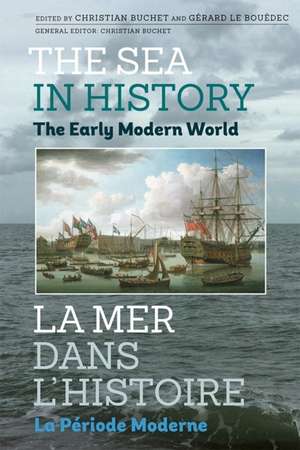Descriere
How important has the sea been in the development of human history? Very important indeed is the conclusion of this ground-breaking four volume work. The books bring together the world's leading maritime historians, who address the question of what difference the sea has made in relation to around 250 situations ranging from the earliest times to the present. They consider, across the entire world, subjects related to human migration, trade, economic development, warfare, the building of political units including states and empires, the dissemination of ideas, culture and religion, and much more, showing how the sea was crucial to all these aspects of human development. The Sea in History - The Early Modern World covers the period from around the end of the fifteenth century up to the conclusion of the Napoleonic Wars in 1815. It examines the establishment and growth of 'the Atlantic World', but also considers maritime developments in the Indian Ocean, Southeast and East Asia and Africa, and highlights the continuing importance of the North Sea and the Baltic. A very wide range of maritime subjects is explored including trade, which went through a huge global expansion in this period; fishing; shipping, shipbuilding, navigation and ports; the role of the sea in the dissemination of religious ideas; the nature of life for sailors in different places and periods; and the impact of trade in particularly important commodities, including wine, slaves, sugar and tobacco. One particularly interesting chapter is on the Hanse, the important maritime commercial 'empire' based in north Germany, which extended much more widely than is often realised and whose significance and huge impact have often been overlooked. 33 of the contributions are in English; 42 are in French. CHRISTIAN BUCHET is Professor of Maritime History, Catholic University of Paris, Scientific Director of Oceanides and a member of l'Academie de marine. GERARD LE BOUDEC is Emeritus Professor of the University of South Brittany.
Cuprins
Introduction - Gérard Le Bouëdec (Université de Bretagne Sud)
Le commerce maritime et la croissance européenne au XVIIIe siècle - Guillaume Daudin (University Paris-Dauphine)
The intensification of Atlantic maritime trade (1492-1815) - David Hancock (University of Michigan)
The growth of Nordic shipping, Scandinavian fleets, their construction, crews and ports 1500-1800 - Leos Müller (Stockholm University)
Le commerce colonial et le développement des ports et des flottes commerciales espagnoles - Manuel Bustos-Rodriguez (University of Cadiz)
De la Hanse aux trois grands ports hanséatiques de Lubeck, Hambourg et Brême : une mutation dans les rapports de forces maritimes en Baltique et Mer du Nord aux XVIe et XVIIe siècles - Marie Louise Pelus-Kaplan (University Paris-Diderot)
Atlantic Commerce and the Rise of Central European Rural Industry (15th-18th Centuries) - Klaus Weber (European University of Viadrina,Frankfurt an der Oder)
le commerce maritime dans l'Atlantique Sud et le développement de la flotte luso-brésilienne à l'époque moderne - Luiz Félipe de Alencastro (University Paris-Sorbonne and the Centro de Estudios do Atlantico Sul, Escola deEconomia
The impact of the Indian local fleets in the development of trade in the Indian Ocean (1500-1800) - Om Prakash (University of Delhi and the Institute of Advanced Study, Nantes)
La dynamique du commerce maritime dans le développement économique Japonais aux XVIIe et XVIIIe siècles - Yujiro Aga (University of Kwansei Gakuin) and Hiroyasu Kimizuka (Waseda University)
The Hybrid maritime actors in Southeast Asia, to 1800 - Anthony Reid (Australian National University, Canberra)
La politique maritime des peuples du golfe de Guinée de l'époque pré-européenne au temps du commerce côtier - Aka Kouame (University of Félix Houphouët-Boigny, Abidjan)
Les dynamiques des circulations maritimes au XVIIIe siècle entre paix et guerre : ports, circuits, flottes entre logiques étatiques et logiques marchandes - Silvia Marzagalli (University of NiceSophia Antipolis)
The European Seaport System at the beginning of the Early Modern Age - Amélia Polónia (University of Porto/CITCEM)
Port location and development in the British Atlantic World in the Seventeenth and Eighteenth Centuries - Kenneth Morgan (Brunel University, London)
Mutations et recompositions des flottes marchandes en Méditerranée (XVIe-XVIIIe siècles) - Gilbert Buti (Aix-Marseille University)
Indian ports and European powers 1500-1800 - Anjana Singh (University of Groningen)
African Atlantic ports and trade fleets, 1500-1800 - Filipa Ribeiro da Silva (International Institute of Social History, Netherlands Royal Academy of Arts and Sciences)
Les ports du Maghreb à l'époque moderne - Sadok Boubaker (University of Tunis)
Pêches méditerranéennes et développement de l'économie maritime (XVIe-XVIIIe siècles) - Daniel Faget (University of Aix-Marseille)
The development of fishing fleets in the North Atlantic ocean, 1500-1800 - David Starkey (University of Hull)
les pêches morutières, terre-neuvières, baleinières en Amérique du Nord, 1500-1800 - Jean François Brière (State University of New York, Albany)
Salt trade in Europe and the development of salt fleets 1500-1800 - Ines Amorim (University of Porto)
Les flottes du vin en Europe : transporter et négocier une marchandise à risque, XVIe-XVIIIe siècles - Anne Wegener Sleeswijk (University Paris 1 Panthéon-Sorbonne)
L'affirmation de l'Europe baltique et scandinave au XVIIIe siècle - Pierrick Pourchasse (University of Western Brittany)
Sugar and the slave trade in the development of Atlantic maritime trade, 1500-1800 - David Eltis (Emory University and the University of British Columbia)
Les flottes négrières de la traite atlantique (XVe-XIXe siècles) - Olivier Grenouilleau (Centre Roland Mousnier, Paris-IV Sorbonne)
Production and export of tobacco: the development of Atlantic maritime commerce (early modern period) - Michael Kwass (Johns Hopkins University)
Asia-Europe Trade, the Demand for Asian Goods and Long-distance Shipping from the Indian Ocean and South China Sea - Maxine Berg (University of Warwick)
The crews costs and the success of the Northern European fleets' penetration in the Mediterranean (XVIth-XVIIth centuries) - Maria Fusaro (University of Exeter)
Marins au cabotage et à la pêche côtière des espaces littoraux ruraux en Europe à l'époque moderne - Thierry Sauzeau (University of Poitiers)
Portugal and the United Provinces; Two Innovative Countries: Common Factors, Related Developments - A Handover - Catia Antunes (Leiden University)
Actors of maritime trade in the British Atlantic: from the "Sea Dogs" to a Trading Empire - Sheryllynne Haggerty (University of Nottingham)
Sailors in the Atlantic fleets in the age of revolution - Niklas Frykman (University of Pittsburgh)
Les villes portuaires dans l'espace atlantique (XVIe-XVIIIe siècle) : un modèle et des variantes - Guy Saupin (University of Nantes)
les formes de financement du commerce maritime en France à l'époque moderne - André Lespagnol (University of Rennes 2)
Villes portuaires et réseaux marchands en Chine, au Japon et en Asie du sud-est, 1500-1800 : commerce, piraterie et géopolitique - François Gipouloux (CNRS)
Les Chinois en Insulinde au XVIIe siècle : de l'intermédiation commerciale à la mainmise sur les échanges maritimes régionaux - Marie-Sybille de Vienne (Institut National des Langues et Civilisations Orientales)
L'Ordre des Hospitaliers de Saint-Jean de Jérusalem, Rhodes et Malte, puissance maritime - Alain Blondy (University of Paris-Sorbonne)
Portugal, the west seafront of Europe - Jorge Semedo de Matos (Portuguese Naval Academy)
Les formes complexes de la prédominance de l'Espagne, première puissance mondiale de l'histoire - Carlos Martinez Shaw (Royal Academy of History, Spain) and Marina Alfonso-Mola (University of Madrid)
Le maritime, fondement de la prédominance commerciale et économique des Provinces-Unies - Louis Sicking (Free University of Amsterdam and Leiden University)
The keys to British success : trade as a motor and sea as a centre - Stanley L. Engerman (University of Rochester)
Le modèle français : la recherche par l'Etat de la prédominance maritime, réussites et échecs (Martine Acerra - University of Nantes)
L'Europe centrale et la mer à l'époque moderne - Olivier Chaline (University of Paris Sorbonne)
Swedish and Danish rivalry to become great powers seen through the development of naval and merchant fleets - Jakob Seerup (National Museum of Denmark)
Ambiguous relations between Russia and the sea : causes and consequences, 16th-17th centuries - Pavel Krotov (State University of Saint Petersburg)
La Perse Séfévide : au défi du " grand jeu " maritime (1501-1736) - Cyrille Poirier-Coutansais (Centre d'études stratégiques de la Marine, France)
Le Grand Mogol et la mer - Michel Vergé-Franceschi (University of Tours)
China's Maritime World - Timothy Brook (University of British Columbia)
Le Japon et la mer - Masashi Haneda (University of Tokyo)
Transformation of the Maritime world in the Indonesian Archipelago, 1500-1800 - Atsushi Ota (Keio University, Tokyo)
Corée : les navires garants de la souveraineté - Alexandre le Bouteiller (Racine Company, France)
L'Afrique et la mer à l'époque moderne (XVe-XVIIIe siècles) - Gérard Chouin (William & Mary, Williamsburg)
La mer et les royaumes du Golfe de Guinée - Nicoué Gayibor (University of Lome, Togo)
Maratha Sea Power - Sachin Pendse (Tolani College of Commerce, Mumbai)
De la décision de se tourner vers la mer - Jean Meyer (University Paris-Sorbonne)
La Chine et la mer. Retour sur images - Paola Calanca (Academia Sinica, Taiwan)
Oceanic Shipping and Trade in the History of Economic Thought - Peter Emmer (University of Leiden)
Social structure and naval power: Britain and the Netherlands - N.A M. Rodger (All Souls College, Oxford)
British governmental values and british naval bureaucracy - Roger Morriss (University of Exeter)
Les retombées littéraires et philosophiques des découvertes maritimes - François Bellec (Académie de Marine, France and Academia de Marinha, Portugal)
Le modèle maritime polynésien ou l'océan source de stimulation intellectuelle - Emmanuel Desclèves (Académie de Marine, France)
An engine, not a Needle : Ocean Navigation as a Motor of Innovation in Europe, 1400-1800 - Larrie Ferreiro (Defense Acquisition University)
The Sea as a Knowledge Development Factor in the Medical Field - Mark Harrison (Wellcome Unit for the History of Medicine, Oxford)
Le rôle capital de la mer pour les transformations agricoles - Jean-Pierre Poussou (University Paris-Sorbonne)
The Sea and the Precocious Transition of the British Isles into a Hegemonic Political and Economic Power 1651-1815 - Patrick O'Brien (London School of Economics)
Les compagnies de commerce, instruments de la puissance maritime - Philippe Haudrère (University of Angers)
Marines européennes, développements administratif, économique et financier, XVIe-XVIIIe siècles - David Plouviez (CRHIA - Universityof Nantes)
Développement naval et développement commercial : les leçons de l'Histoire 1500-1815 - Patrick Villiers (University of the Littoral Opal Coast)
De la primauté des capitales maritimes sur les capitales terrestres - Pierre-François Tuel (University of Le Havre)
The Rise and Fall of the Chinese Pirates : From Initiators to Obstructors of Maritime Trade, 1500-1800 - Ei Murakami (Kyoto University)
Les gens de mer et l'Etat : la mobilisation navale en Europe, XVIe-XVIIIe siècles - André Zysberg (University of Caen)
The necessity and consequences of internationalisation : maritime work in the Dutch Republic in the seventeenth and eighteenth centuries - Jelle van Lottum (RoyalNetherlands Academy of Arts and Sciences, Amsterdam)
The professionalisation of the English Navy and its administration, 1660-1750 - Daniel A. Baugh (Cornell University)
L'Etat espagnol et le commerce colonial, XVIe-XVIIIe siècles - Antonio Miguel Bernal (University of Sevilla) and Agustin Guimera Ravina (Spanish National Research Council)
The Peruvian Viceroyalty and the Pacific - Jorge Ortiz (Naval War College, Peru)
The Control of Landing Operations - Richard Harding (University of Westminster)
Conclusion : Réussir par la mer, dominer par la mer au temps de la première mondialisation - Gérard Le Bouëdec (Université de Bretagne Sud)









